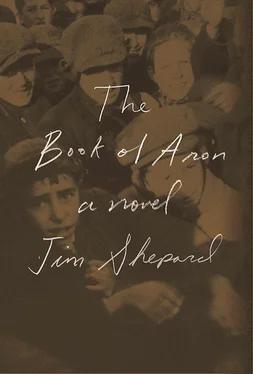“Do I have to do everything?” he said. “Do I have to go and find him?”
“He’s not going to listen,” she told him. And he closed his eyes and didn’t answer.
“I have no idea what we’re going to do with Balbina,” he told her instead. “If you want to measure your resistance to going crazy, try helping a shlemiel.”
“She’s still getting her bearings,” she said. “She didn’t have as much responsibility at the other orphanage.”
“You put the paper in her hand. She has to deliver it today; here is the address and the hour,” he said. “But she’s lost the paper or forgotten to take it with her or got frightened or the porter told her to go somewhere else. She’ll go tomorrow. She’ll go the next day. She’ll go when she finishes the cleaning. And was it so important anyway?” He put his hand over his eyes and Madame Stefa told him that he was being unkind.
“I am unkind,” he said. “To work here you have to be unkind. You have to be smeared with crap, you have to stink, you have to be crafty.”
“You seem presentable enough when you make your calls,” she said.
“I don’t make calls,” he said. “I go to beg for money and food. It’s hard and degrading.”
“I know that,” she said.
“You,” he said to me. “You never read. Do you want to sink into idiocy?”
“Leave him alone,” Madame Stefa said. “He’s making progress in his schooling.”
“His schooling ?” he said. “This is a prison. A plague ship. An asylum. A casino. A sprung trap. Bodies you clear from the street in the morning have piled up again by the evening.”
“That’s no reason to frighten children,” she told him.
“Everyone’s been tainted by this,” he said.
“You have a lot to do tomorrow,” she told him. “You need to rest.” She filled his glass from the pitcher beside it. He took it and had a long swallow.
“Do you know how Jerzyk got here?” he asked. She took a deep breath and told him no. He said Jerzyk’s whole family had died in quarantine and he’d dug up his father’s body to get a golden dental bridge to sell for food but then had to use the money to buy his way out of the Umschlagplatz. “Do you understand what I mean?” he said. “He had to dig his father’s head out of the dirt and then pull the bridge out of his father’s mouth. And then he didn’t get the food he needed anyway.”
Someone cried out downstairs and Madame Stefa left to investigate. Korczak was so still afterwards that I thought he’d fallen asleep.
He didn’t open his eyes when she came back. “I always think that the relief we feel after the roundups tells us something,” she said. “Why are we relieved to be left here ? And why are they starting with old people and children? Why would you begin by resettling those who’d have the most trouble in a strange place?”
Korczak sat up and poured himself another glass from the pitcher. Then he lay back down and closed his eyes without drinking it.
Dora had been rounded up twice and made it back each time, Madame Stefa told him. Dora said if they were ever taken to the Umschlagplatz to hang behind at the tail end of the march because when the trains got filled up they sometimes let the other people go.
Korczak said that was good advice.
“We shouldn’t be speaking like this in front of the boy,” she said tiredly. Korczak agreed.
“Are you ever going to go to bed?” he asked me. I shook my head.
He seemed unsurprised. He said Korczak the dreamer was already far away. Outside of the city. Already in a desert and walking all by himself. He sees an unfamiliar country, he said. He sees a river and a bridge. He sees boats. And over there: small houses, cows and horses. He hadn’t realized everything in Palestine was so small. He keeps walking, he said, until he can’t walk anymore. He keeps walking, until the moment before he just falls down.
THE NEXT NIGHT MADAME STEFA WAS TOO exhausted to stay awake so it was just the two of us. Then I fell asleep on Mietek’s bed and when I woke it was almost light and Madame Stefa was getting the day’s report. Korczak pulled the paper from one window but otherwise let everyone sleep. He told her Reginka had the rheumatic rash and that during the night he had administered salicylate until she’d heard ringing in her ears and seen yellow. She’d vomited twice and the lumps on her legs were turning pale and no longer hurt. He said Mietek was still having trouble breathing.
“Your cigarettes are probably not helping,” Madame Stefa said.
He told her that smoke was a good expectorant for the children and she answered that this was his theory. She said that sometimes when she came up to see him the air was so bad that she couldn’t breathe. He said she reminded him of that entire stern regiment of women — wife, grannie, cook — to which his father had always given in for the sake of peace.
“Is he asleep?” she asked, and I didn’t hear his response but I didn’t move. My head was turned away.
She said two of the girls no longer claimed to be hungry and seemed to be hibernating. Others were no longer sleeping because of hunger insomnia. She kept them covered but they were always thirsty and cold. Their stools were semi-liquid and muddled. When she pressed their skin the dimples lasted nearly two minutes. One was so clumsy with weakness she couldn’t fasten a button. The hungriest were always appearing and disappearing around the kitchen. They all had scabies and crusted ringworm.
Death by famine lacked drama, Korczak told her. It was slow and dispiriting. At least until the crows or the rats or the dogs came along.
“Oh, stop it,” she told him.
“Am I being heartless?” he asked her.
“You’re being unhelpful,” she told him.
“I find it helps if I tell myself that children can die or recover here,” he said, “just as they do in a hospital.”
“Yes,” she said. “Something strange happened today. When I emptied the chamber pots this morning I found a street boy outside our door.”
“I can smell the ammonia,” he said. “And that’s not strange. Did you let him in?”
“He didn’t want to come in,” she told him. “He wanted to see into the main hall. I even stepped aside so he could look all he wanted. When I asked him his business he went on his way.”
“I know how he feels,” Korczak said.
I stayed by the window and watched the street that day and the next but saw no sign of Boris. One kid in a blue cap watched the orphanage both days but it wasn’t him. I didn’t go outside. Everyone claimed I was selfish because I took too long on the toilet. Everyone argued over who had had the worse night. Everyone was preoccupied with his morning temperature. “What is it?” kids asked staff members who were still trying to read their thermometers. “What was yours?” they asked one another.
At dinner Korczak announced the orphanage would be putting on a play called The Post Office by an Indian poet. It would be mounted on the third floor in the former ballroom, which would need to be cleaned and cleared for the event. The text was available to read for the next day or two and auditions would be held after that. One of the staff members, Esterka, would direct it. He asked her to stand to receive our thanks and she gave a wave.
There was a new girl whose brother had left her at the orphanage who kept everyone up with her nightmares and her crying. Her name was Gieńa and she was nine and during the day she didn’t bother anyone though she didn’t work either. Her father had died of tuberculosis and her mother and older sisters of typhus and before dropping her off her older brother had dressed her in so many ribbons and beads and colored crepe streamers that I made her laugh by asking if she was a Hottentot. She ate shielding her plate with her hand. In the dark she screamed so much that for a few nights since I was awake anyway I took her up to the third floor so everyone else could sleep. I sat with her while she wailed and she told me about her brother Samuel, who was seventeen and worked in one of the shops, and showed me how she stood on his feet and put her arms around his waist and was carried around the room when he marched. Her aunt had been unhappy because she said Gieńa ate all the bread and in no time it would all be gone and she told Samuel to put his sister in the orphanage so she didn’t have to live with someone who was stealing from her. Telling her story calmed Gieńa down but the spiders on the third floor upset her. I said she could only go back down if she stopped screaming, so she promised she would and the next night when I checked she was awake and weeping but doing it quietly. She showed me a shell in her palm and chanted, “Snail, snail, show me your horns,” and after we both watched for a minute it did.
Читать дальше












